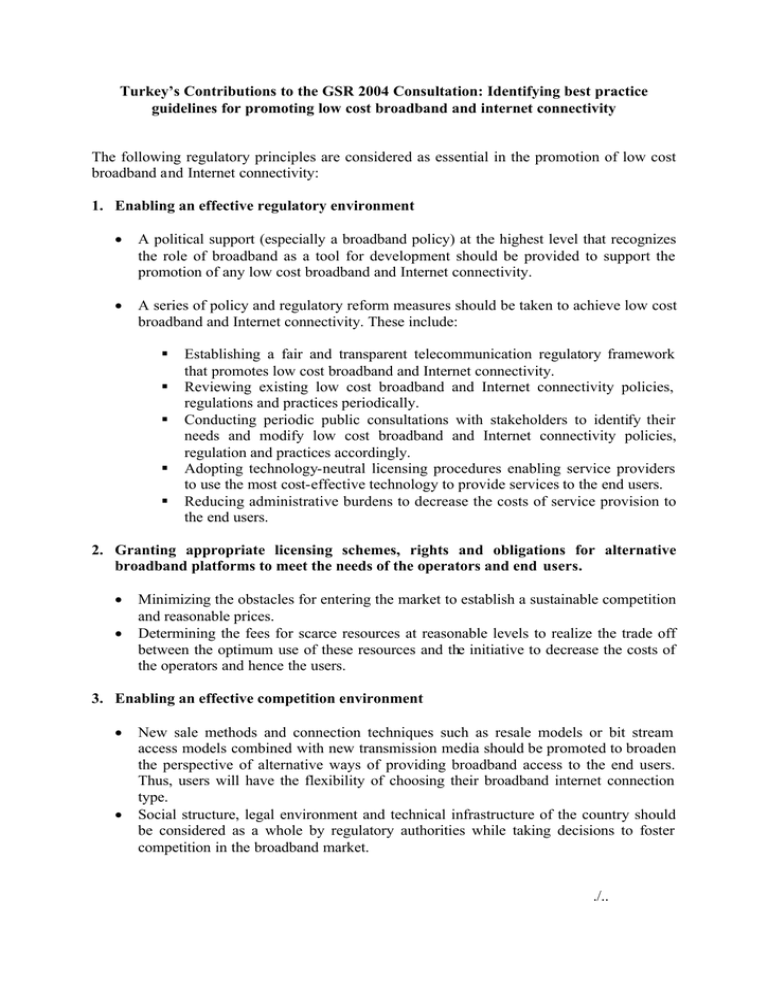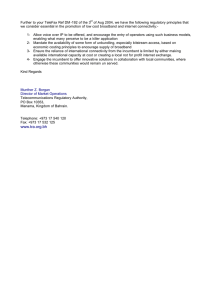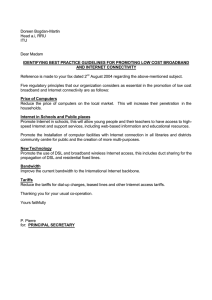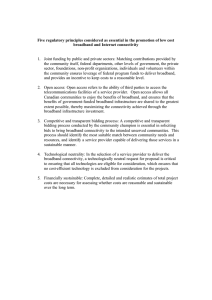Turkey’s Contributions to the GSR 2004 Consultation: Identifying best practice
advertisement

Turkey’s Contributions to the GSR 2004 Consultation: Identifying best practice guidelines for promoting low cost broadband and internet connectivity The following regulatory principles are considered as essential in the promotion of low cost broadband and Internet connectivity: 1. Enabling an effective regulatory environment • A political support (especially a broadband policy) at the highest level that recognizes the role of broadband as a tool for development should be provided to support the promotion of any low cost broadband and Internet connectivity. • A series of policy and regulatory reform measures should be taken to achieve low cost broadband and Internet connectivity. These include: § § § § § Establishing a fair and transparent telecommunication regulatory framework that promotes low cost broadband and Internet connectivity. Reviewing existing low cost broadband and Internet connectivity policies, regulations and practices periodically. Conducting periodic public consultations with stakeholders to identify their needs and modify low cost broadband and Internet connectivity policies, regulation and practices accordingly. Adopting technology-neutral licensing procedures enabling service providers to use the most cost-effective technology to provide services to the end users. Reducing administrative burdens to decrease the costs of service provision to the end users. 2. Granting appropriate licensing schemes, rights and obligations for alternative broadband platforms to meet the needs of the operators and end users. • • Minimizing the obstacles for entering the market to establish a sustainable competition and reasonable prices. Determining the fees for scarce resources at reasonable levels to realize the trade off between the optimum use of these resources and the initiative to decrease the costs of the operators and hence the users. 3. Enabling an effective competition environment • • New sale methods and connection techniques such as resale models or bit stream access models combined with new transmission media should be promoted to broaden the perspective of alternative ways of providing broadband access to the end users. Thus, users will have the flexibility of choosing their broadband internet connection type. Social structure, legal environment and technical infrastructure of the country should be considered as a whole by regulatory authorities while taking decisions to foster competition in the broadband market. ./.. -2- • • • • Customer rights and customer satisfaction should be emphasized both by decisions of the regulatory authority and by the legal structure to establish a high level competition in the market. Internet Service Providers (ISPs) should be monitored periodically in terms of service quality, service efficiency and service costs to obtain accurate information on the market structure and social needs. ISP that has significant market power or dominant power should be obliged to obey specific rules in order to protect the rights of ISPs that are financially weak. The tariffs for the broadband services of notified operators (DSL, backhauling services, partial leased lines) should allow a reasonable retail- wholesale margin to alternative operators so that they will have the possibility to sustain their market shares through the transition period to facility-based competition which is to be achieved by the methods like LLU and alternative infrastructures such as fiber or wireless networks in a considerably long process.


